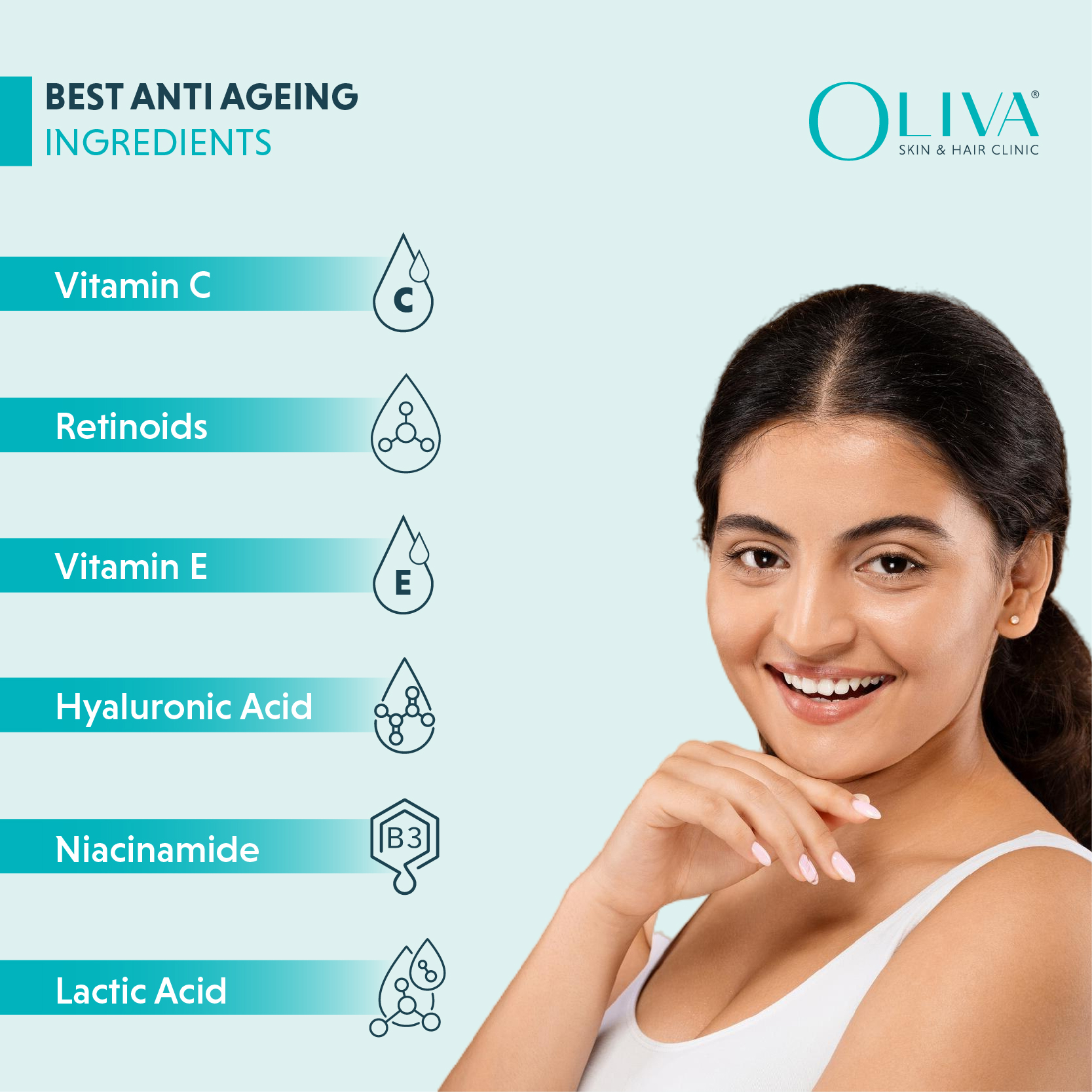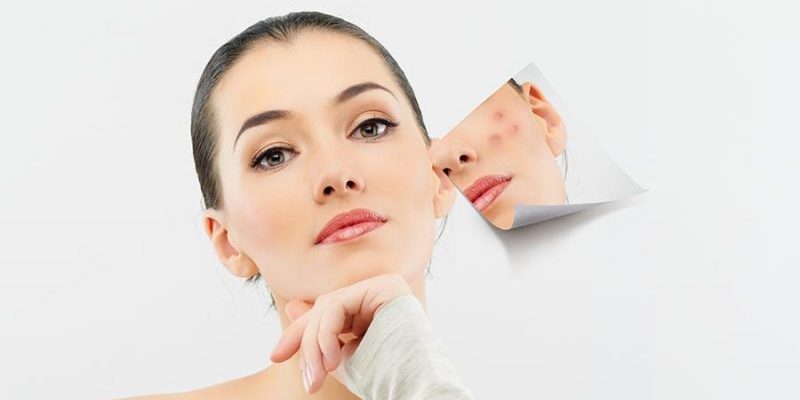Table Of Content
14 Anti Aging Ingredients For Youthful Skin
Our skin changes as we grow older. Fine lines, wrinkles, and age spots appear. Anti aging skincare plays a key role in maintaining a youthful look and healthy skin. The right anti aging ingredients can fight visible aging signs and keep your skin looking young. This guide shows some top ingredients. It explains their perks and how to use them for the best results. Scientists have proven certain ingredients work well in anti aging skincare. These include vitamin C retinoids, hyaluronic acid, peptides, and antioxidants. Each component tackles a different skin aging concern. Vitamin C, for example, makes skin brighter and lessens dark spots. Retinoids boost collagen production. Hyaluronic acid adds moisture to the skin. Peptides improve skin’s elasticity. Knowing what these anti aging cream ingredients do helps people pick the right skincare products. This knowledge allows them to create better skincare routines.
Table Of Content

What Are Anti Aging Ingredients? How Do They Work?
Anti aging ingredients are essential for maintaining skin health and appearance as we age. These ingredients target various signs of aging, such as wrinkles, fine lines, and loss of elasticity, providing a comprehensive approach to skincare. Incorporating natural ingredients can also be beneficial, as they often offer gentler alternatives to synthetic compounds, reducing the risk of irritation and side effects. Here are some of the ways they work:
-
Prevention and Protection:
Many anti aging ingredients protect the skin from environmental damage, like UV rays and pollution. Substances such as antioxidants tackle free radicals, which might cause oxidative stress and speed up aging. Sunscreen plays a key role in guarding against UV radiation, a major cause of early aging.
-
Collagen Production:
Collagen is an essential protein that keeps skin firm and youthful. Retinoids, peptides, and some collagen supplements increase collagen production. This helps reduce fine lines and wrinkles and enhance skin tightness.
-
Hydration:
Keeping skin hydrated is vital for a fresh look. Hyaluronic acid, a strong humectant, draws and holds skin moisture, keeping it plump and smooth. Moisturisers are very important in anti aging. They prevent moisture loss and improve the skin’s protective barrier function.
-
Cell Turnover and Renewal:
Skincare products like retinoids and exfoliating agents like lactic acid speed up cell turnover. They help get rid of old, dead skin and allow new and healthy skin to grow. This makes the skin’s surface smoother and its colour even, and it helps reduce age spots and dull skin.
-
Pigmentation Control:
Concerns like hyperpigmentation often affect mature skin. Skin-brightening ingredients like vitamin C and tranexamic acid can lighten these dark patches and even out the skin colour, making it look younger.
-
Skin Barrier Function:
It’s important to keep the skin barrier healthy to protect the skin and retain moisture. Ingredients like ceramides make the skin barrier stronger, helping it fight off environmental damage.
Now you know why to use anti aging ingredicnts in your skincare routine. Let us find out what are the best anti aging ingredients in the next section.
Top 14 Anti aging Ingredients:
By using these anti aging components in a daily skincare routine, people can fight aging signs well and keep their skin looking young and bright.
-
Vitamin C:
What Is It?
Vitamin C, a strong antioxidant, is necessary for making collagen and protecting the skin. It aids in preventing and reversing environmental damage caused by pollution and UV rays, which can speed up aging.
How Does It Work For Anti Aging?
Vitamin C fights off free radicals, lessens dark spots, and helps make more collagen, which makes skin tighter and brighter. It helps skin stay youthful and reduces fine lines and wrinkles.
Effectiveness For Aging Concerns:
Vitamin C reduces wrinkles, fine lines, and dark spots improving skin texture and tone. It prevents damage due to stress and keeps the skin bright and youthful.
How To Use?
Each morning, put on a Vitamin C serum right after you wash your face and before you put on moisturiser for the best results. Make sure your serum has a stable Vitamin C formula, like ascorbic acid or derivatives for the best results.
-
Retinoids:
What Are They?
Retinoids are Vitamin A derivatives and are best known for their powerful anti aging effects. They help speed up the renewal of skin cells and boost collagen production, tackling various signs of aging.
How Does It Work For Anti Aging?
Retinoids speed up the renewal of skin cells, boost collagen production, and reduce the appearance of fine lines and wrinkles. They also make skin texture smoother and help achieve an even skin tone.
Effectiveness For Aging Concerns:
Retinoids are very good at treating acne, reducing fine lines, and improving skin texture. Doctors often prescribe them for different aging concerns. They also help lighten dark spots and make the overall skin glow.
How To Use?
Begin with a low concentration and put it on at night to avoid photosensitivity. Always top it with a moisturiser and wear sunscreen during the day because retinoids make your skin more sensitive to the sun rays.
-
Hyaluronic Acid:
What Is It?
Hyaluronic acid is a substance that exists in the skin and helps in holding moisture well. It keeps the skin hydrated and full.
How Does It Work For Anti Aging?
Hyaluronic acid draws in and holds water to hydrate the skin, which makes fine lines and wrinkles less noticeable. It also helps improves skin’s elasticity making it look tighter and softer.
Effectiveness For Aging Concerns:
Hyaluronic acid works well to keep the skin moist, soften the fine lines, and help the skin look younger. This ingredient is good for all types of skin. It makes the skin barrier better and enhances skin health.
How To Use?
Put on hyaluronic acid serum after you wash your face and before you apply a moisturiser, in both the morning and evening. Because it is light, it sinks into the skin and hydrates right away.
-
Peptides:
What Is It?
Peptides are small strings of amino acids which work as the main parts of proteins such as collagen and elastin. These are important for the skin’s structure and strength.
How Does It Work For Anti Aging?
Peptides stimulate collagen production, which boosts the skin’s firmness and flexibility. By aiding the skin’s natural repair, peptides reduce wrinkles and help achieve smoother skin.
Effectiveness For Aging Concerns:
Peptides help improve skin barrier function, decrease wrinkles, and enhance overall skin texture. They keep the skin hydrated, making it look fuller and younger.
How To Use It?
Apply peptide serums or creams after you clean your skin, both in the morning and at night. These products work well with other active ingredients, and you can apply them after your moisturiser to get more benefits.
-
Vitamin E:
What Is It?
Vitamin E is a strong antioxidant that helps keep the skin safe from damage caused by free radicals. It helps prevent aging and keeps the skin healthy.
How Does It Work For Anti Aging?
Vitamin E hydrates the skin and makes its protective barrier stronger. This cuts down on moisture loss and makes the skin more supple. By fighting off free radicals, it stops the skin from aging and helps it look young.
Effectiveness For Aging Concerns:
Vitamin E makes the skin more hydrated, lowers inflammation and boosts skin repair. Using it often can reduce the apperance of visible aging signs, giving the skin a smoother and brighter look.
How To Use?
Apply moisturisers or serums with Vitamin E every day in the evening, to get the most healing from them. Search for skincare products that contain tocopherol or tocopheryl acetate, which are stable forms of Vitamin E that absorb well into the skin.
-
Niacinamide:
What Is It?
Niacinamide, also known as Vitamin B3, improves skin health and appearance with its various uses.
How Does It Work For Anti Aging?
Niacinamide increases collagen formation, enhances skin elasticity, and strengthens the skin barrier. It fortifies the skin’s defence against external factors.
Effectiveness For Aging Concerns:
Niacinamide decrease wrinkles, fine lines, and dark spots, supporting a more even skin tone and texture. It also keeps oil production under control, making it ideal for those with oily and acne-prone skin.
How To Use:
Use niacinamide serums or creams twice daily, following a cleansing ritual, both in the morning and at night. It’s easy-to-absorb and light and leads to bright and clear skin .
-
Bakuchiol:
What Is It?
Bakuchiol, derived from Psoralea corylifolia plant seeds, serves as a natural substitute for retinol. It delivers similar advantages without the adverse effects of retinol.
How Does It Work For Anti Aging?
Bakuchiol boosts collagen production, improves skin elasticity, and minimises fine lines and wrinkles. It accelerates cell turnover and skin renewal, leaving skin smoother and more firm.
Effectiveness For Aging Concerns:
Bakuchiol helps lessen aging signs like fine lines and dark spots while being gentle on sensitive skin. It also reduces inflammation making it great for people who have acne.
How To Use?
At night, put on Bakuchiol serums or creams after washing your face. Start slow and use more as your skin gets used to it. During the day, add moisturiser and sunscreen for better skin defence and moisture.
-
Tranexamic Acid:
What is it?
Tranexamic acid is a skincare element famous for making dark spots lighter and smoothing out skin tone.
How Does It Work For Anti Aging?
Tranexamic acid inhibits melanin production, which decreases dark spots and pigmentation due to sun exposure and aging. It helps make skin tone even and brighter.
Effectiveness For Aging Concerns:
Tranexamic acid works well for melasma, sunspots, and post-inflammatory hyperpigmentation. Using it can lessen pigmentation and prevent dark spots.
How To Use?
After cleaning your face, apply tranexamic acid serums or creams at night to address pigmentation concerns. During the day, use sunscreen to protect your skin from UV rays that can cause pigmentation.
-
Lactic Acid:
What Is It?
Lactic acid is an alpha-hydroxy acid (AHA) from milk known for its exfoliating and skin-renewing traits.
How Does It Work For Anti Aging?
Lactic acid softly removes the dead skin cells and boosts cell turnover. It enhances collagen production, making the skin firmer and decreasing wrinkles and fine lines.
Effectiveness For Aging Concerns:
Lactic acid boosts skin moisture, improves textures, and increases skin glow. It also lightens dark spots and enhances the effectiveness of other skincare products.
How To Use?
Start using lactic acid serums or creams at night with low concentrations to prevent irritation. Increase the amount slowly if your skin can handle it. Always use moisturiser and sunscreen during the day.
-
Azelaic Acid:
What Is It?
Azelaic acid is a derivative of barley and wheat. It is known for its ability to fight inflammation and bacteria.
How Does It Work For Anti Aging?
Azelaic acid fights inflammation, opens up pores, and makes the skin’s texture and tone better by helping control the growth of skin cells and the production of melanin. It works well against acne and rosacea and is good for sensitive skin.
Effectiveness For Aging Concerns:
Azelaic acid eases hyperpigmentation, smoothens fine lines, and lessens acne scars’ visibility. It helps make the complexion clear and boosts the skin’s overall clarity and glow.
How To Use?
Apply azelaic acid creams or gels after you clean your face at night to address various skin issues. Begin with a small amount and increase gradually. Always use moisturiser and sunscreen in the morning.
-
Collagen:
What Is It?
Collagen is a type of protein that gives structure and strength to the skin. It is crucial for keeping skin young and tight.
How Does It Work For Anti Aging?
Collagen boosts skin by giving it elasticity and strength, which diminishes fine lines and wrinkles. It helps achieve a smoother and younger-looking skin.
Effectiveness For Aging Concerns:
Collagen products like supplements and lotions make skin stretchy, moist, and smooth. They add back collagen lost due to aging and environmental damage, restoring the skin’s elasticity and strength.
How To Use?
Use collagen in forms such as powder, cream, serums, and pills for ideal results. Add these to your everyday routine to keep your skin healthy and youthful.
-
Jojoba Oil:
What Is It?
Jojoba oil is a natural extract that comes from the seeds of the jojoba plant. It is famous for making skin moist and calm.
How Does It Work For Anti Aging?
Jojoba oil acts like sebum, offering deep hydration without blocking the pores. It helps reduce fine lines and wrinkles and restore the skin’s youthful glow.
Effectiveness For Aging Concerns:
Jojoba oil improves skin’s elasticity, calms irritations, and makes skin texture smoother. It supports a strong skin shield and guards against external factors that speed up aging.
How To Use?
You can apply jojoba oil to your skin or mix it with your favourite moisturiser. For the best results, use it every day. Its non-greasy and light texture suits all skin types. It offers quick moisture and comfort that lasts long.
-
Ceramides:
What Is It?
Ceramides are fats that help form the skin’s barrier. They keep moisture in and protect the skin from damage by the environment.
How Does It Work For Anti Aging?
Ceramides fix the skin’s barrier, hold in moisture, and make the skin more elastic. They replace lost fats, boost skin moisture, and help reduce fine lines and wrinkles.
Effectiveness For Aging Concerns:
Ceramides help fight aging signs by fixing the skin barrier and keeping moisture levels right. They make the skin texture better and firmer so that it looks young and feels smoother.
How To Use?
Apply creams or serums that have a lot of ceramides every day to keep the skin moist and secure the barrier. Add them to your skincare steps after you wash your face apply a good amount to benefit from its moisturising power.
-
Ferulic Acid:
What Is It?
Ferulic acid, a strong antioxidant, is present in plants such as rice bran and oats. It is famous in skincare for fighting free radicals, which lead to skin aging.
How Does It Work For Anti Aging?
Ferulic acid fights free radicals and cuts down oxidative stress on skin cells. It helps reduce wrinkles, fine lines, and age spots that environmental factors like UV rays and pollution cause.
Effectiveness For Aging Concerns:
Regarding aging issues, research shows that ferulic acid boosts the power of other antioxidants like vitamins C and E when used together. This mix gives extra protection to the skin, helping it look younger.
How To Use?
To add ferulic acid to your skincare routine, select serums or creams that contain it. Use it in the morning before applying sunscreen to enhance protection from UV-induced aging.
Best Anti Aging Skincare Routine:
To keep your skin looking young, you need a carefully curated skincare routine with powerful ingredients that fight aging. Here’s your guide to keeping your skin glowing, healthy and young:
Steps For An Effective Anti Aging Routine:
- Begin by washing your face with a soft cleanser. This gets rid of dirt without taking out essential oils. It gets your skin ready for more care without making it dry or irritated.
- Next, use a serum loaded with anti aging ingredients like vitamin C and retinoids. People love Vitamin C for its antioxidant benefits, which fight off free radicals and make the skin tone brighter. Retinoids form vitamin A, up collagen production and quicken cell turnover, which reduces fine lines and wrinkles over time.
- Give your skin lots of moisture with products that have hyaluronic acid. Famous for holding onto moisture well, hyaluronic acid makes fine lines less visible and gives a youthful glow.
- Always end your routine with broad-spectrum sunscreen. This type of sunscreen protects your skin from UVA and UVB rays. It prevents sun damage and works against aging.
Common Mistakes To Avoid In Choosing Anti Aging Ingredients
Using harsh products too much can damage the skin barrier. This leads to irritation and speeds up aging. Failing to apply sunscreen reduces how well other anti aging methods work. If you don’t change your skincare routine as you grow older, your products might not work well and you may not achieve the desired results.
Anti Aging Strategies:
Improve your skincare routine with overall methods that tackle aging from many aspects:
Diet and lifestyle tips for healthy skin:
- Add foods rich in antioxidants, such as berries, dark leafy green vegetables and nuts, to your diet. These foods contain lots of vitamins and minerals that help keep skin healthy and safe from oxidative stress.
- Drink a lot of water all day for proper hydration. This is important for keeping skin elastic, helping cells to renew faster, and preventing wrinkles and fine lines.
The Impact Of Hydration On Skin Health And Appearance:
Taking in enough water is key to keeping your skin looking full and young. Staying hydrated strengthens the skin’s protectiev barrier, improves its elasticity, and keeps your skin healthy.
Professional treatments and when to consider them:
Think about getting professional skincare solutions such as chemical peels, Botox, fillers or laser treatments with help from a trained dermatologist or skin expert. These procedures treat aging issues more effectively than OTC products. They make big changes in how your skin feels and looks. You can fight aging signs well and keep your skin looking young and fresh for a long time.
Takeaway
Adding the top anti aging elements to your skincare plan can battle aging signs well and keep the skin looking young. You might choose well-tested ingredients such as vitamin C, retinoids, and hyaluronic acid or go for natural options like rosehip oil and green tea extract. Sticking to your skincare routine is crucial. Always shield your skin from UV damage with daily sunscreen application. By learning the advantages and correct ways to use these ingredients, you can tailor a skincare routine that fits your unique aging issues and enhances skin health overall. Knowing what your skin needs is important for good results that last. Stay tuned for more skincare tips!
Frequently Asked Questions
Vitamin C shields skin from aging by neutralising harmful radicals, boosting collagen production, and making the skin tone brighter.
Retinoids quicken the renewal of skin cells, boost collagen production, and make the skin texture smoother, which helps reduce wrinkles and fine lines.
Hyaluronic acid moisturises the skin, fills it out to smooth out small lines and wrinkles, and helps maintain a youthful look.
While it’s safe to say that hyaluronic acid works best at any age. However, the ability of skin cells to lock moisture and produce collagen decreases with age, and then hyaluronic acid becomes even more beneficial to human skin.
Peptides can also stimulate the synthesis of collagen and make the skin elastic and firm, giving your skin a more youthful appearance. They aid in effectively providing anti aging benefits to the skin.
Yes, antioxidants like vitamin C, E, and ferulic acid neutralise the free radicals, protect against oxidative stress, and thereby prevent premature aging of the skin.
Yes, moisturisers do provide hydration to aging skin; they improve barrier function while reducing the appearance of fine lines and wrinkles.
Niacinamide demonstrates good effectiveness when used in concentrations of 2-5% in topical skin products for reducing fineg lines and wrinkles, skin texture, and hyperpigmentation.
Yes, bakuchiol is, in general, quite well tolerated and good for everyday usage, as it provides retinol-like benefits without irritation.
Changes should become noticeable in skin texture and wrinkles, especially fine lines, anywhere between several weeks and a couple of months after constant usage with bakuchiol.
Tranexamic acid helps in brightening skin tone, further reducing hyperpigmentation and improving overall skin clarity.
The long-term use of azelaic acid can improve skin texture and reduce breakouts of acne, as well as help with hyperpigmentation. The result is an even complexion.
Retinol is generally more effective for anti aging because it can increase cell turnover and collagen production, while lactic acid primarily exfoliates and hydrates the skin.
Lactic acid primarily exfoliates and hydrates the skin; it fails to directly increase collagen production.
Collagen supplements containing collagen types I and III are generally best for boosting elasticity and wrinkle reduction.
Chicken skin, fish, bone broth and egg whites are some examples of foods high in collagen.
You can apply Vitamin E capsules over the face for hydration and protection against oxidative stress, which may help to reduce the presence of wrinkles.
It contains vitamins and minerals that reduce skin wrinkles and maintain skin elasticity by keeping skin replenished.
Yes, using sunscreen daily does protect the skin from damaging UV raysand prevent wrinkles, sunspots, and premature aging.
A diet high in antioxidants, vitamins and good fats helps in supporting the health of the skin and lowers inflammation, thus promoting youthful skin.
Skincare products with ceramides are effective at concentrations in the order of 1-3% for enhancing the skin barrier and improving moisture retention.
Ceramides are instrumental in maintaining the skin barrier and hydration, while collagen makes the skin more structured and elastic. Choosing between collagen and ceramides depends on your skin concerns.
Hydrated skin looks younger because adequate moisture enhances elasticity, smoothness, and texture overall, which reduces the appearance of wrinkles and fine lines.
Yes. Hydration adds to the firm appearance of skin, which is requisite for young-looking skin, free from aging signs such as wrinkles and sagging.
The effective supplements with collagen differ, but often products containing types I and III collagen in the proper dose come in the form of topical applications for the maintenance of skin elasticity and skin hydration.
Begin using jojoba oil on dry, clean skin and massage it gently until the skin absorbs it. Use daily to help reduce the appearance of wrinkles and fine lines.
Skincare products containing about 1-3% ceramides help strengthen skin barrier function and enhance moisture retention.
Ferulic acid is an antioxidant that lets other antioxidants, such as vitamins C and E, maintain their stability and work more effectively to protect the skin against free radicals and give a youthful look.
History
Current Version
August 1, 2024
Written By
Dr. Debatri DattaEdited By
Dr. Debatri DattaMedically Reviewed By
Dr. Debatri DattaJanuary 3, 2024
Written By
Dr. Debatri DattaEdited By
Dr. Debatri DattaMedically Reviewed By
Dr. Debatri DattaSeptember 6, 2024
Written By
Dr. Debatri DattaEdited By
Dr. Debatri DattaMedically Reviewed By
Dr. Debatri DattaRead This Next

13 Natural Ways to Prevent Premature Greying

Amazing Benefits Of Glycolic Acid Peel For Acne, Scars & Hyperpigmentation

Ginger for Weight Loss: Nutritional Profile, Benefits & Best Ways to Use It

7-Day PCOS Indian Diet Plan For Weight Loss

Hair Transplant Success Rate | Factors & Best Techniques Explained



